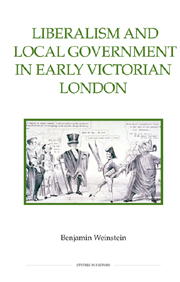Book contents
- Frontmatter
- Contents
- Acknowledgements
- Abbreviations
- Introduction
- 1 Liberal attachments to the unreformed metropolis
- 2 The ‘radicalisation’ of metropolitan political culture, 1832–1841
- 3 The polarisation of metropolitan political culture, 1842–1855
- 4 Redefining the state, I: Rates and taxes, 1834–1853
- 5 Redefining the state, II: The London government problem
- 6 Marylebone in 1854: from conflict to compromise
- Conclusion
- Bibliography
- Index
2 - The ‘radicalisation’ of metropolitan political culture, 1832–1841
Published online by Cambridge University Press: 12 September 2012
- Frontmatter
- Contents
- Acknowledgements
- Abbreviations
- Introduction
- 1 Liberal attachments to the unreformed metropolis
- 2 The ‘radicalisation’ of metropolitan political culture, 1832–1841
- 3 The polarisation of metropolitan political culture, 1842–1855
- 4 Redefining the state, I: Rates and taxes, 1834–1853
- 5 Redefining the state, II: The London government problem
- 6 Marylebone in 1854: from conflict to compromise
- Conclusion
- Bibliography
- Index
Summary
In late November 1831 Charles Grey dismissed fears that parliamentary reform would precipitate social revolution. In particular, Grey did not share the concern, voiced by many Tory opponents of reform, that London's increased representation would result in a flood of plebeian ultra-radicals into parliament. Although he acknowledged that the proposed Whig reform bill would extend the metropolitan franchise quite far down the social ladder (owing to higher metropolitan property prices), Grey had been reassured by Lord Durham and by Lord Althorp that the £20 householder, rather than the £10 householder, would predominate in the metropolitan electorate. Grey consequently anticipated the return of ‘respectable’ middle-class men. In Tower Hamlets and Finsbury, Grey claimed, ‘the returns will probably be commercial, in Marylebone probably of persons connected with the law, or of those who are supported by the better description of persons resident in that opulent and extensive quarter’. Grey's predictions were sensible and, as it turned out, fairly accurate. At the first reformed election, Tower Hamlets returned William Clay, a successful merchant and chairman of two metropolitan water companies; Marylebone, meanwhile, chose as its representative Sir William Horne, a prominent barrister and longtime resident of that ‘opulent and extensive quarter’. Finsbury defied Grey's vision by returning the wealthy barrister Robert Grant and, because Charles Babbage and Thomas Wakley split the radical vote, a Tory military man. Although Finsbury had fallen to a Whig lawyer and a Tory patrician, Lambeth stayed true to its commercial and industrial character by returning as its first MP Benjamin Hawes, a soap manufacturer who, according to Richard Monckton Milnes, embodied perfectly ‘the respectable and intelligent bourgeois’.
- Type
- Chapter
- Information
- Publisher: Boydell & BrewerPrint publication year: 2011

